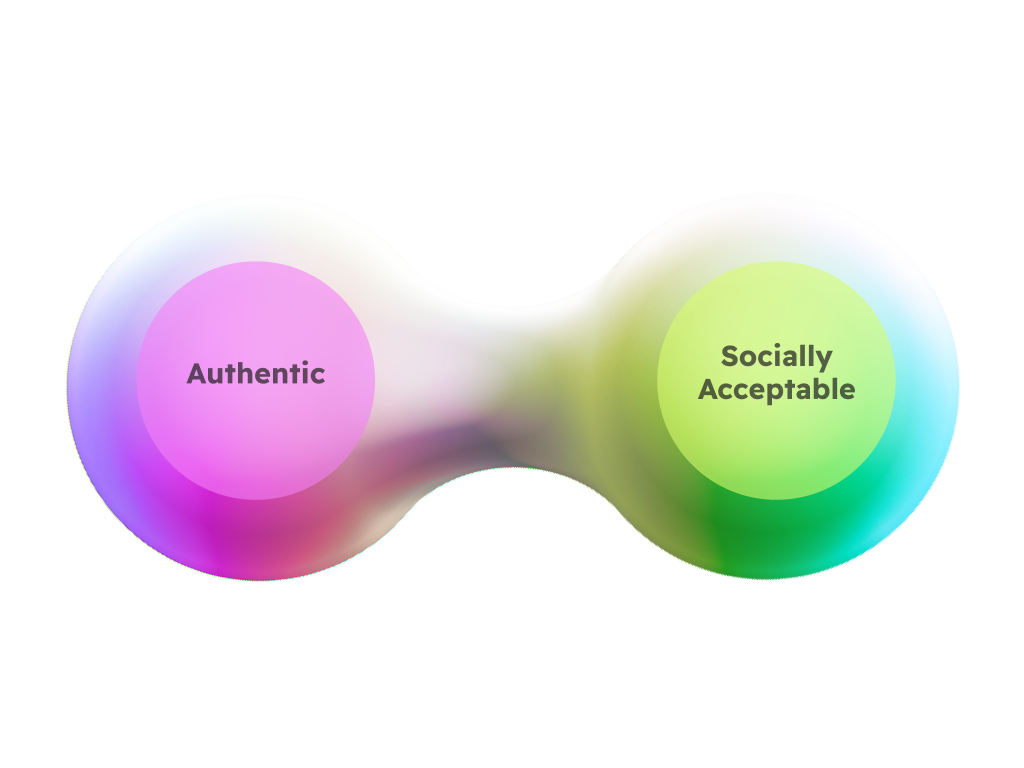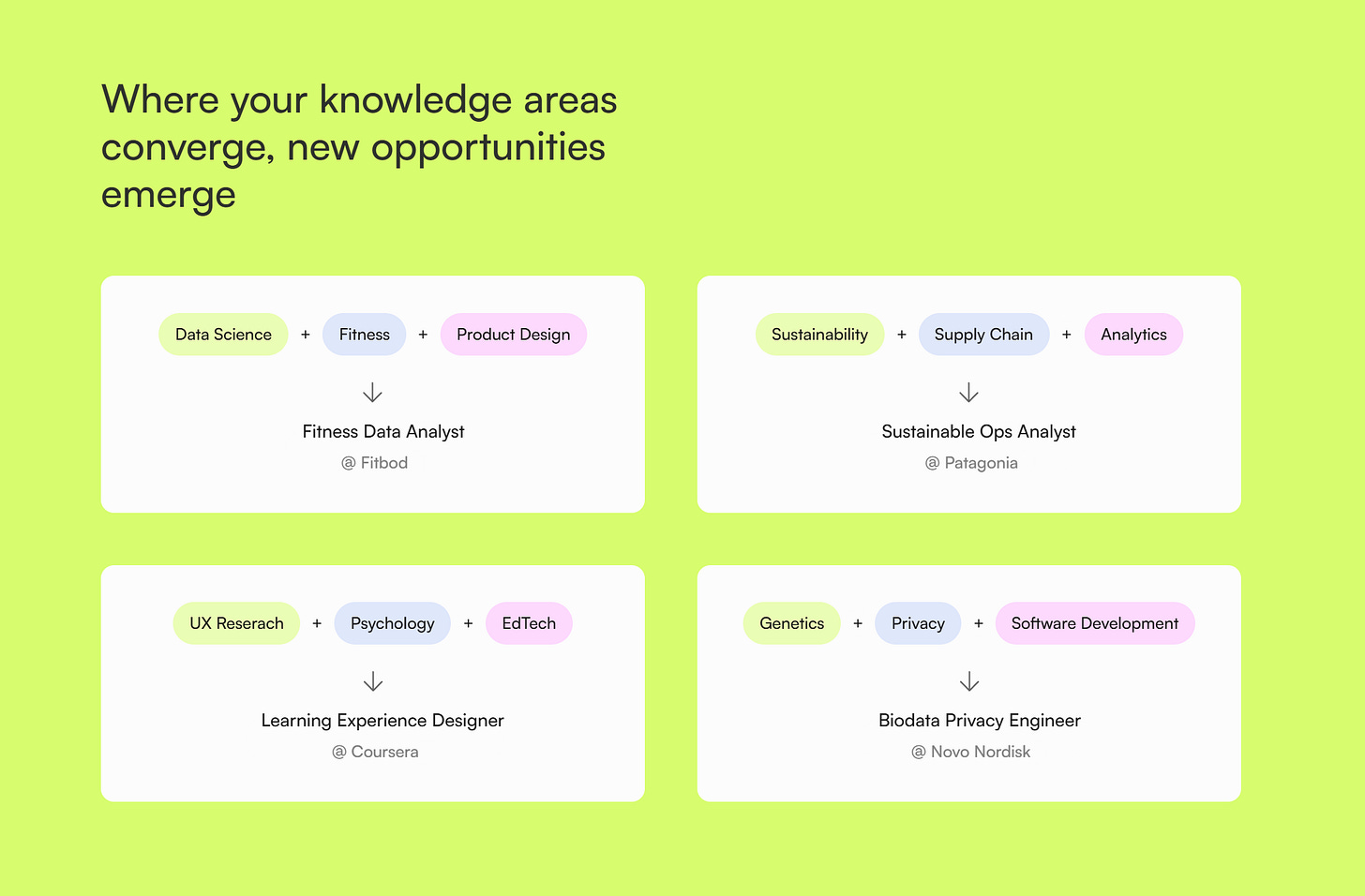Digital Facets: The New Art of Authentic Living
How the internet age transforms our search for a socially accepted True Self
The deeper you venture into self-discovery, the more paradoxes you encounter. What seemed like a straightforward journey to find your True Self reveals itself as a maze of contradictions.
The Authenticity Paradox
Being authentic is simple, yet finding authenticity within can be excruciatingly complicated. Once you've found the authenticity inside, expressing it becomes natural - you just remain in contact with yourself and learn not to get in your own way. But first, you need to connect with that authenticity within. And to connect with something, you need to find it first.
Why is this search so challenging?
Because to even begin considering authentic expression, we first need to get in touch with our inner selves and learn to cultivate self-love. This proves especially difficult for those who grew up with conditional love. Flipping this script is simple in theory, but rarely easy in practice.
The Price of Authenticity
The precursor to being authentic is self-love. One can’t be authentic if one doesn’t unconditionally love oneself.
Looking back, any exploration of socially acceptable authentic self could begin only once I have established a stable contact with my authentic self.
In other words – I figured out a way to become authentic first, and only then started to explore ways for me to be socially acceptable with this authenticity.
I don’t believe the steps could be reversed.
It doesn’t make sense to start from a false, but already socially accepted self and try to move to an authentic self while keeping the social acceptance. You can't have your cake and eat it too.
In order to get something you need to lose something. Just like Odin from Norse mythology, who sacrificed his eye to gain wisdom and knowledge, or Marie Curie losing her health in the pursuit of scientific knowledge.
Authenticity, like all valuable things – requires sacrifice, but it also requires courage.
Authenticity is Hard
What does it mean to be authentic?
Being authentic means not hiding.
It means letting the light shine from within. Freely. In all directions. Without filtering. Being authentic also means not pulling any punches and accepting the consequences of you being authentic. Whatever these would be.
To let your authenticity shine, you need to accept the consequences of its light.
And you bet it’s gonna shine on things all over the place, with the brightness and light color that you can’t really control.
This is scary.
Because it naturally leads to unforeseen consequences. And these uncontrolled consequences, all the potentialities are in essence what gives us heebie-jeebies.
This is to be expected because we live in an ego-centric, dominator society that rewards forsaking our True Selves and punishes any such transgressions.
After all, we are easier to control that way. Having enduring contact with the True Self means we become free.
Free people are hard to control.
All those explorers who managed to free themselves are facing yet another uphill battle. Even with the authenticity compass in hand, navigating contemporary realities can be challenging for them.
Why?
Because their compass is showing many Norths. It’s constantly spinning.
Internet of Many-selves
The digital revolution hasn't just changed how we communicate – it's transformed how we express who we are. Through screens and networks, authenticity has evolved into something more nuanced and multidimensional than ever before.
At first glance, this digital fragmentation might seem concerning. After all, we're now choosing different faces to present to different groups of people. Doesn't this sound like wearing masks? And isn't wearing masks the opposite of being authentic?
Not quite.
The problem lies in our outdated pursuit of a singular, unified self. We've been conditioned to seek "one true voice" or "ultimate authenticity" – as if we're searching for some kind of internal yogurt, smooth and uniform throughout. But human beings aren't meant to be homogeneous.
We are kaleidoscopes of experience. Inside each of us live countless facets – the imaginative dreamer, the analytical thinker, the spiritual seeker, the strategic planner. Being truly human means embracing all these aspects of who we are.
This brings us to an intriguing question: among all these facets, which one represents our most authentic self? But perhaps that's not even the right question to ask.
The digital age has ushered in what
calls the post-individual era. Instead of forcing all our aspects into one acceptable mold, we can now find spaces that resonate with each distinct part of who we are. These digital communities act as mirrors, reflecting and validating different aspects of our authentic expression.Picture someone expressing their analytical mind in a data science community, while sharing their creative spirit in an art collective, and exploring their philosophical nature in a meditation group. Each of these expressions is genuinely authentic – they're all true facets of the same multidimensional self.
What makes this particularly powerful is how these communities transcend physical limitations. Someone passionate about business strategy or Eastern philosophy no longer needs to feel isolated in their immediate surroundings. Somewhere in the vast digital landscape, their tribe awaits.
Communities in Contrast and Convergence
These digital tribes we find ourselves in can seem worlds apart. Peek into a community of experimental digital artists, and you'll find spaces exploding with surreal creations and radical aesthetics. Their members shape-shift between multiple digital personas, constantly pushing against the boundaries of what's possible. The pace is electric, the innovation relentless.
Scroll over to a slow-living community, and you enter an entirely different universe. Here, members thoughtfully document their journey toward simplicity – sharing photos of handmade pottery, discussing the merits of digital detox, and exploring the art of doing less. Some might go weeks without posting, practicing what they preach.
At first glance, these worlds seem irreconcilable. How could someone authentically belong to both? Yet they can, and they do.
Consider a systems designer who spends her days architecting complex digital experiences. By night, she tends to her meditation practice and cultivates a minimalist home life. Neither aspect is more "real" than the other – they're both genuine expressions of her whole self. The seeming contradiction creates a beautiful harmony.
But something even more fascinating happens as people move freely between these distinct spaces. Natural bridges begin to form. Unexpected connections spark new possibilities. A business leader brings Eastern philosophical principles into corporate strategy. A mindfulness teacher develops digital tools for meditation. A slow-living advocate creates beautiful digital content about simple living.
These intersections aren't compromises – they're evolutionary leaps. When authentic expressions from different worlds collide, they don't dilute each other. Instead, they create entirely new forms of authentic expression. New communities emerge around these synthesis points, proving that authenticity isn't about choosing one truth, but about allowing our many truths to dance together.
The digital age hasn't just given us permission to be multiple selves – it's showing us how these selves can weave together into something richer than we imagined possible.
Finding Your Authentic Constellation
Perhaps finding our authentic voice isn't quite what we imagined. It's not about discovering one perfect, unchanging self to present to the world. Nor is it about maintaining completely separate identities that never touch or influence each other.
Instead, authenticity in the digital age looks more like cultivating a constellation of genuine expressions. Each point of light represents a facet of who we are, shining in its own unique way. Some stars naturally group together, forming patterns we recognize. Others might seem distant from each other, yet they're all part of the same night sky – our sky.
The true power lies in how we navigate this personal cosmos. We're no longer bound by the need to choose between being "authentic" and being "socially acceptable." Instead, we can learn to move fluidly between different expressions of our authentic self, finding communities that resonate with each aspect of who we are.
What matters isn't whether we're expressing one unified self or many facets. What matters is that each expression comes from a place of genuine self-love and acceptance. Because when we truly accept ourselves - all of ourselves - we create space for others to do the same.
The journey to authenticity still requires courage. It still demands that we face our fears of being seen, of being judged, of not fitting in. But now we understand that fitting in doesn't mean fitting into one box – it means finding the right constellations for each star in our sky.
And perhaps that's the most beautiful paradox of all: in embracing our many authentic selves, we don't become more fragmented. We become more whole 🙏
A New Frontier: Domain Synthesis
I'm currently developing a system to help people create their own authentic niches through what I call Domain Synthesis. It's a framework that empowers you to thoughtfully combine different domains of interest and expertise into unique, personally meaningful spaces for authentic expression.
If this resonates with you, I'll be launching a Wishlist sign-up next week where you can be among the first to explore this approach. Stay tuned folks! ✨










I don't see self-love as a precursor to authenticity. I think it's self-awareness and self-knowledge. I've got this short definition of authenticity from Claude: Conscious alignment between internal values and external expression. I understand it as being true to my core values in how I express myself to the world. I like your idea of different communities in the digital world being expressions of part of who we truly are. I've never seen conflict in being a member of different, sometimes seemingly contradicting tribes. The conflict might arise when you put labels on yourself like 'I'm this or that' - then you enclose yourself in a box.